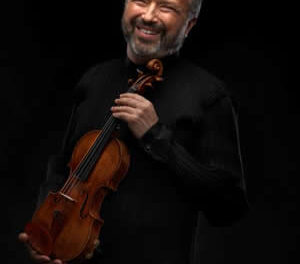Although musical theatre is flexible enough to treat many kinds of subjects, few of us think of it as a vehicle for portraying a deeply disturbing subject such as injustice, racial and religious bigotry, and man’s inhumanity to man. But the audience which saw Jason Robert Brown’s Parade in Memorial Hall on the UNC campus in Chapel Hill will never forget the dramatic and musical portrayal of unreasoned hatred resulting in the inevitable death of a man guilty of nothing but his religious heritage and place of birth.
This important work, in the Stephen Sondheim tradition of the stage musical, captures and retains the attention of everyone in the theatre from the opening curtain to the shattering conclusion. Moreover, it is appropriately named. We have all heard stories of similar events all our lives but are never less than shocked when they come before our eyes in a parade we cannot ignore.
The scenes in Parade, set in Atlanta, work well together because the coincidence of dramatic events and the music attached to them is so right. The two settings of the opening number, “The Old Red Hills of Home,” and the 1913 Confederate Memorial Day song “The Dream of Atlanta,” show the population’s love of its Dixie heritage at the same time that Leo Frank, a Jew born in New York, is busy at his job in a factory, singing in frustration “How Can I Call This Home?” After young Mary Phagan’s murder, for which Leo is accused, he is standing in the Atlanta police stations singing in confusion “I Am Trying to Remember,” as he unsatisfactorily recounts what he did at the time the girl was murdered. The detectives investigating the murder are not really listening, for they believe they have the guilty man. All these events and the musical representation of them turn on dramatic irony and foreshadow disaster for Leo Frank in a community where he has no respect and no friends.
The audience already knows what will be the conclusion of this accusation, and their worst fears are verified by the song of the inebriated news reporter Craig, as he shambles along drunkenly singing ironically about the “Big News!” which never happens in an uneventful Southern town, and then a bit later sings gleefully of “Real Big News,” as he writes articles damning Leo based on the lies of people who do not know Leo but would like to see him convicted. The prosecutor is unable to prove that Leo committed the murder but is not overly concerned about lack of evidence, singing only that “Something Ain’t Right.” The majority of music in the trial scenes heaps more guilt on Leo, with numerous characters singing of Leo’s suspicious looks at some of the girls in the factory and his habit of taking them up to his office, and in general doing all they can to convict him. No one stands up for Leo.
The climax of Parade is not surprising, but even so it is shocking. When Leo’s enemies learn that he has a chance to be a free man, a group of them takes him from his cell in the State Prison Farm and lynches him. As they prepare to commit the act, Leo quietly returns his wedding ring to his wife and then sings quietly a Hebrew prayer as his life ends. How ironic that his resignation to this mockery of justice leads him to prayer and his killers to loud rejoicing in his death.
All the people in the cast of Parade gave excellent performances as actors, singers and dancers. As Leo Frank, Sean Casserly played and sang convincingly, and often in an understated fashion, the role of a simple man who sits quietly most of the time, even with his world going to pieces around him, and reveals a surprising sense of humor when he speaks. His greatest moment comes at the end of his life, when he faces death with resignation and prays quietly a Hebrew prayer. As Lucille Frank, Rachel Wender offers a solid performance from her first scene to her last, showing with skill the growth of a woman who at first is primarily interested in curling her hair and at the last knows how much her husband loves her. Her singing is effective, powerful and moving. Patrick Massey offered a stellar performance as the boozy newspaper reporter Craig, who sings with enthusiasm about the great news story, based only on colossal untruths, that he has the good luck to write. I especially recognize Stafford Wing as the aged and ill Judge Roan, who in “A Letter to the Governor” expresses fears that he has convicted an innocent man of murder and urges the Governor to review the case against Leo. Perhaps this song is the most telling statement in this musical drama of the evil resulting from religious bigotry and surrendering to the appeals of blind hatred.











